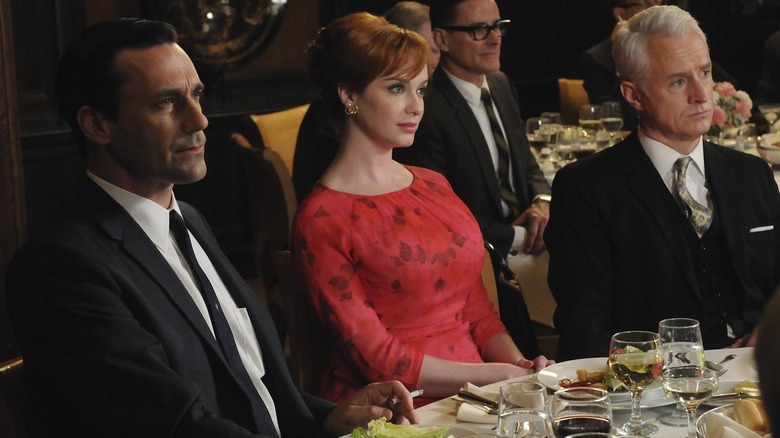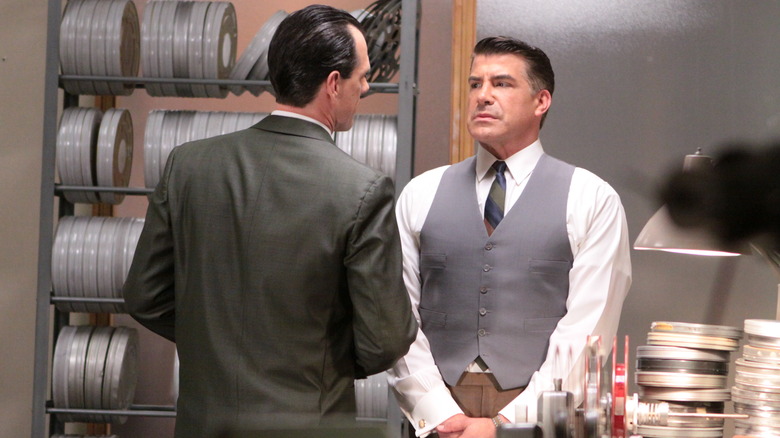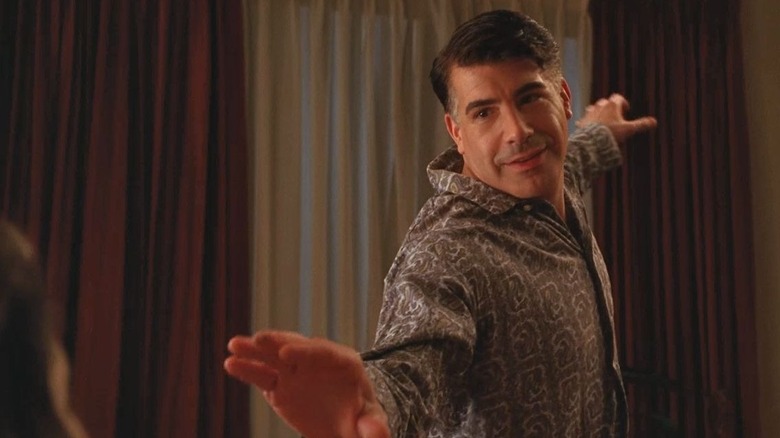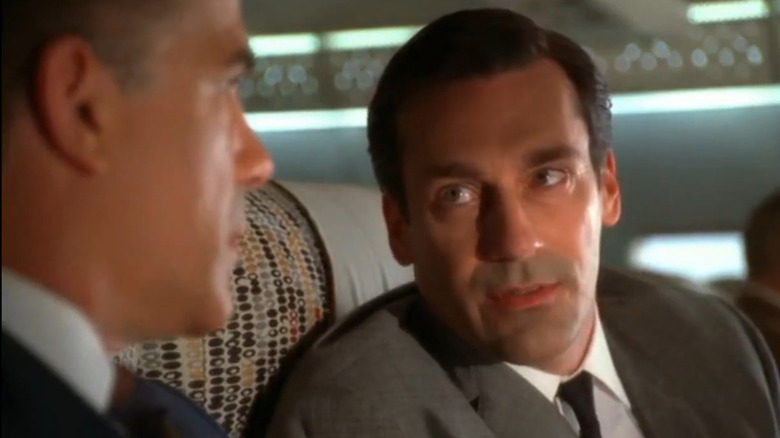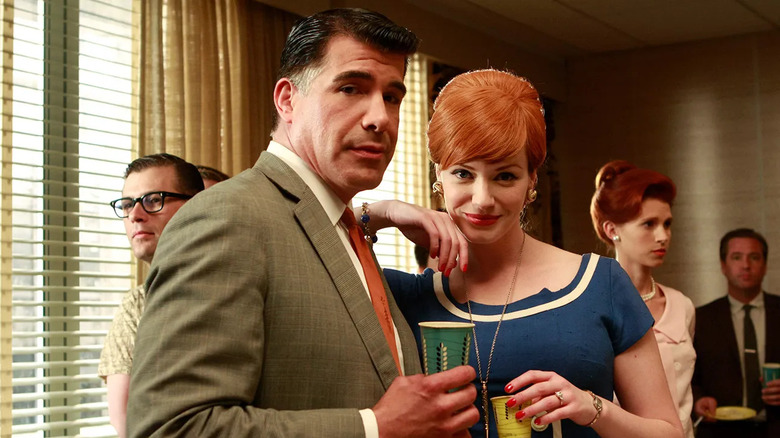One Popular Mad Men Character Was Supposed To Return To The Show (But Never Did)
"Mad Men" has often sparked positive headlines for its compelling, often-inspiring storylines around its female characters like Peggy (Elisabeth Moss) and Joan (Christina Hendricks), but it's never gotten the same praise for the handling of its queer characters. There's a good reason for that: although characters like Sal (Bryan Batt) and Bob Benson (James Wolk) are interesting and well-written, their stories are pretty depressing. Bob never finds love over the course of the series, and Joan's lesbian friend in season 1 has her attempt to come out of the closet politely declined.
The only happy queer characters throughout the series are Kurt (Edin Gali), a minor European character who gives Peggy a cool haircut, and Joyce (Zosia Mamet), Peggy's openly lesbian friend in season 4 — but both of these characters play minor roles. The most prominent gay character in "Mad Men" is Salvatore Romano, and things don't go well for him.
After two and a half seasons of staying in the closet, Sal rejects the advances of Lee Garner, Jr. (Darren Pettie), a powerful character who's in charge of the firm's $25 million Lucky Strike account. His ego bruised, Garner tells Harry he wants Sal off the account, and Harry (useless as always) does nothing about it. (A simple heads up to Sal about the situation would've been nice.) Because Lucky Strike is easily the firm's biggest client by this point, Sal is abruptly fired by Roger as a result.
Don lets Sal go - now what?
There's still hope for Sal at this point: he goes to Don (Jon Hamm), our main character, who already knows Sal is gay and has chosen to be cool about it. But it turns out that Don's sympathy for Sal's secret life only goes so far. He assumes Sal was more of a willing participant in Garner's advances than he really was, and either way, Lucky Strike is such an important client that he couldn't be an ally here even if he wanted to. Don refuses to save Sal's job, and sprinkles in a little '60s-era homophobia for good measure.
Sal is last seen giving a phone call at a truck stop to his wife. He tells her he's coming home, but the implication is that he's given up on holding together the idealized straight lifestyle he's supposed to want. It seems like he's embracing his sexuality, even if it means the end of his career and marriage.
Sounds like an interesting development for his character, right? The sort of thing the show could maybe follow up on for a scene or two down the line? Well, too bad. This is the end of Sal in "Mad Men." Although other written-off characters like Paul (Michael Gladis) and Rachel (Maggie Siff) got follow-up storylines later in the series, "Mad Men" leaves Sal at the truck stop, forcing us to imagine where his life went from there. It's not necessarily a bad ending; it's just a painful one.
What makes it hurt more is the revelation that, for showrunner Matt Weiner at least, Sal's storyline wasn't supposed to end this way. In 2015, actor Bryan Batt wrote an article for Esquire reflecting on his experience in "Mad Men," and the show's unfinished business with Sal:
"[Matt Weiner] explained that this was the course for the character, but that I shouldn't worry: Sal would come back. He kept saying that, a few times at awards shows after we finished shooting, which was quite interesting. I knew how much Matt loved all of his characters and the actors he cast in them, and how difficult it must have been to do the inevitable."
If Sal had returned, what would that have looked like?
"Matt mentioned along the way that Sal could come back as a big director, but I think the storyline took a different route," Batt speculated, later adding: "I'd like to think that Sal had a happy ending, that he does realize who he is and moves on. Unfortunately he'd have to break little Kitty's heart, but I think she had the clues by the end of the third season."
Sure enough, "Mad Men" had already planted the seeds for the dissolution of Sal's marriage before he was fired. Although Sal's love for Kitty (Sarah Drew) seems real in a platonic way, Kitty herself has always seemed unsatisfied with what he's able to give her. She picks up on Sal's interest in his coworker Ken in season 2, and even if she doesn't consciously recognize it as Sal being attracted to him, she sees enough to feel jealous and upset.
Then of course there's the Bye Bye Birdy scene, where Sal gets a little too enthusiastic while singing the very feminine, flamboyant song, and we can see the dawning horror on Kitty's face as she realizes the thing she's long been trying not to realize. It seems that much like Betty and Don, there is no happy ending for Sal that involves their marriage staying together.
Bryan Batt's other guess about Sal's future: "I think his mother dies too. His Italian mother dies and it was an impetus to go, 'you know what? I'm pretending for you, for all these other people. I'm going to be who I am.' I imagine him walking through the West Village as Stonewall happens and getting swept up in it."
Sal's many parallels with Don and Betty
Batt's comment about Sal's mother feels reminiscent of Betty's character arc throughout the show, which is subtly spurred on by the death of her own mother not long before the series begins. Betty's mom is implied to be a major influence on her, someone with strong expectations for the housewife role Betty's supposed to play, and it's only after her death that Betty starts developing the freedom to expect a little more from life.
"Mad Men" was always interested in how other people's expectations are a bit of a prison, and that freeing yourself from those expectations is ultimately good for you, even if it's painful in the moment. Batt's belief that the death of Sal's mother would be the beginning of a transformative period for him sure has merit; it's easy to picture that sort of character arc playing out for him.
But overall, the Draper with whom Sal has the most in common is clearly Don. In season 3, both characters have a secret side of themselves they're hiding from the world, and both are in doomed marriages. They're also living in a time right before the Kennedy assassination, which "Mad Men" treats as a pivotal turning point from the restrictive '50s to the bolder, boundary-breaking '60s.
For Don, Kennedy's death marks the end of his marriage and the beginning of his first proper attempt at self-improvement throughout seasons 4 and 5. It's easy to see the same thing playing out for Sal. Maybe he too gets swept up by the chaos and change of this new era, hopefully without the depressing backsliding Don goes through in seasons 6 and 7. If Sal did return in later seasons, maybe he would've been happier and more open than we'd ever seen him. He could've made for a fun contrast with Don, who failed to grow and change as much as he needed to.
Then again, maybe the lack of closure is for the best
"This is me projecting," Batt wrote, "But I think that the sendoff was so strong and so upsetting, that Sal's firing was so unfair, but so true to what would happen at that time, and what did happen and will continue sometimes to happen, that bringing Sal back wouldn't have been as strong. Matt wouldn't do anything that isn't the best."
To illustrate his point, he brought up the brief and controversial return of Paul Kinsey in "Mad Men" season 5. Paul was never a fan-favorite exactly, always viewed by the fans and the characters as self-important and untalented, but nobody expected his life to fall apart as much as it did here. Season 5 reveals that, after Paul was written out in season 3, he lost a string of advertising jobs before quitting the business altogether, joining a Hare Krishna group and pinning all his hopes on a "Star Trek" script that wasn't very good.
"When Michael [Gladis] returned for his Hare Krishna moment I asked him what it was like. He told me, 'Don't do it,'" Batt recalled. "I guess it was kind of like living the last act of 'Our Town' ... You know it's going to be great for that one time, but then it's over. You know it's over, and you can never go back."
Alongside Kinsey's sad return, "Mad Men" briefly brought back Midge (Rosemarie DeWitt), whose life had also fallen apart in the years since Don and her parted ways. Likewise, when the show caught back up with Rachel, it was only with the reveal that she had died of cancer. Not every returning character's storyline is depressing — Freddy (Joel Murray), for instance, manages to get his life back on track in later seasons — but there are enough sad examples to justify some apprehension over what a returning Sal might look like.
If latter-day "Mad Men" had brought back Sal only to reveal that his life had been a disaster post-Sterling Cooper, most fans would've regretted asking for his return. But as long as Sal stayed away, we can always imagine for him the better future he deserved. We never got to see Sal find happiness on screen, but at least there's nothing in the later seasons to contradict Batt's dream for the character.
